
by Gideon Marcus
"Gideon"—the very name connotes greatness. Grandeur. Brilliance. Romance. Surely, any world with that namesake must be a living paradise. So it is no wonder that the Federation bought the reports sent from planet Gideon declaring it to be just that. No wonder that the Federation would tie itself in knots so as not to jeopardize the chances of welcoming Gideon to the Federation.
Unfortunately, Gideon has other plans.
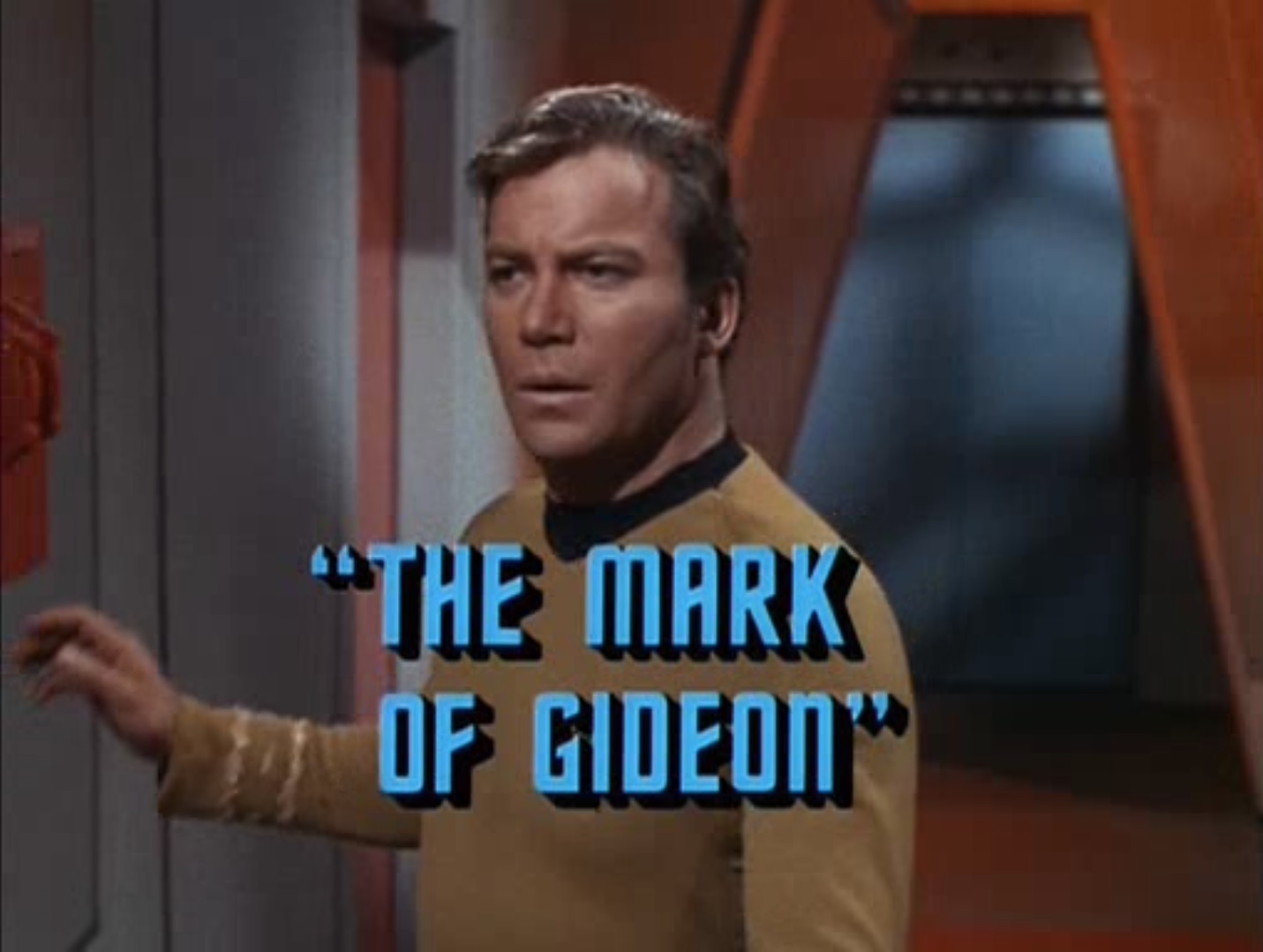
From the moment Captain Kirk, the sole allowed representative of the Federation, beams down to Gideon, "The Mark of Gideon" catches your attention. We've seen Kirk on an empty Enterprise before—in "This Side of Paradise", "By Any Other Name", and (sort of) "Wink of an Eye", but it's no less effective for its repetition. Sure, it's just a re-use of the standing sets on Stage 9, but then so was "The Tholian Web", "The Omega Glory" and "Mirror, Mirror". Indeed, because we have seen the sets used to represent other ships and other dimensions, the audience has already been trained to think in terms of historical precedents rather than the true situation.
That true situation, of course, is that Kirk is actually in a fantastically detailed replica of the Enterprise, so good that it takes him a (credulity-stretching given how quickly Spock figures things out) long time to figure out that he's not on his beloved ship. But fairly quickly, the episode's focus returns to the real Enterprise and Spock doing his usual sterling job in command, the "Mark of Gideon" becomes less "Where is Everybody?" and more "Stopover in a Quiet Town" (respectively, the first episode of The Twilight Zone, and one of the very last).
The plot is quite simple: Gideon was once Heaven-on-Earth, but it has since become a Malthusian nightmare due to the one-two punch of no native diseases and a fanatical reverence for life. Only the very privileged get a few square meters of space to themselves (Holy Shades of the Soviet Union, Batman!) So, the Gideon council hatches a plan to capture Kirk, withdraw some of his blood, and use the lingering, though harmless, remnants of Vegan Meningitis therein to infect Odona, the council chair's daughter. She will then serve as an example and a vector to infect the rest of the population of Gideon, which presumably will be devastated before natural immunity kicks in (or enough Gideonites stop wanting to be sick).
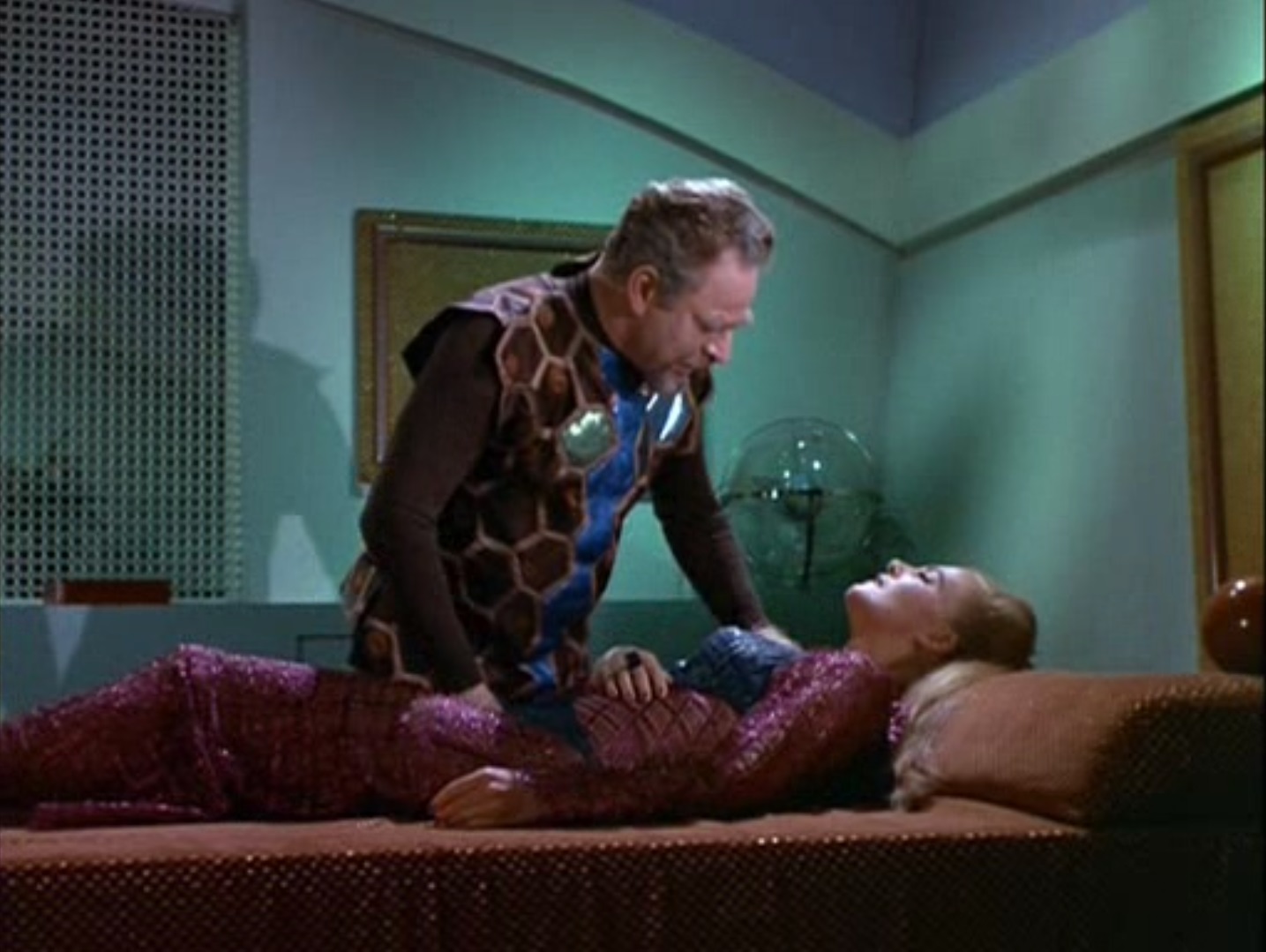
"Father, could I have a Bayer? No other aspirin works better."
The real problem with this episode is not the story, nor the effective bits with Kirk and Odona on the empty ship, nor the entertaining segments featuring Spock sparring with Chairman Hodin. It's that the plot and the events don't match up.
Regarding the disease: it's not stated what happens if mortality turns out to be 100%, or what the Gideonites will do once the disease loses its lethality.
It's never explicitly stated, either, why (or how) the Gideonites went through the trouble of building a replica of a starship on their surface for the purpose of letting Kirk wander around in it. If all they need is his blood, he could have been kept unconscious for the nine minutes required to take his blood and then sent back to the Enterprise with some kind of cover story. Did the plan really require that Odona join Kirk in the simulated halls of the starship? Did she really need to fake falling for him?
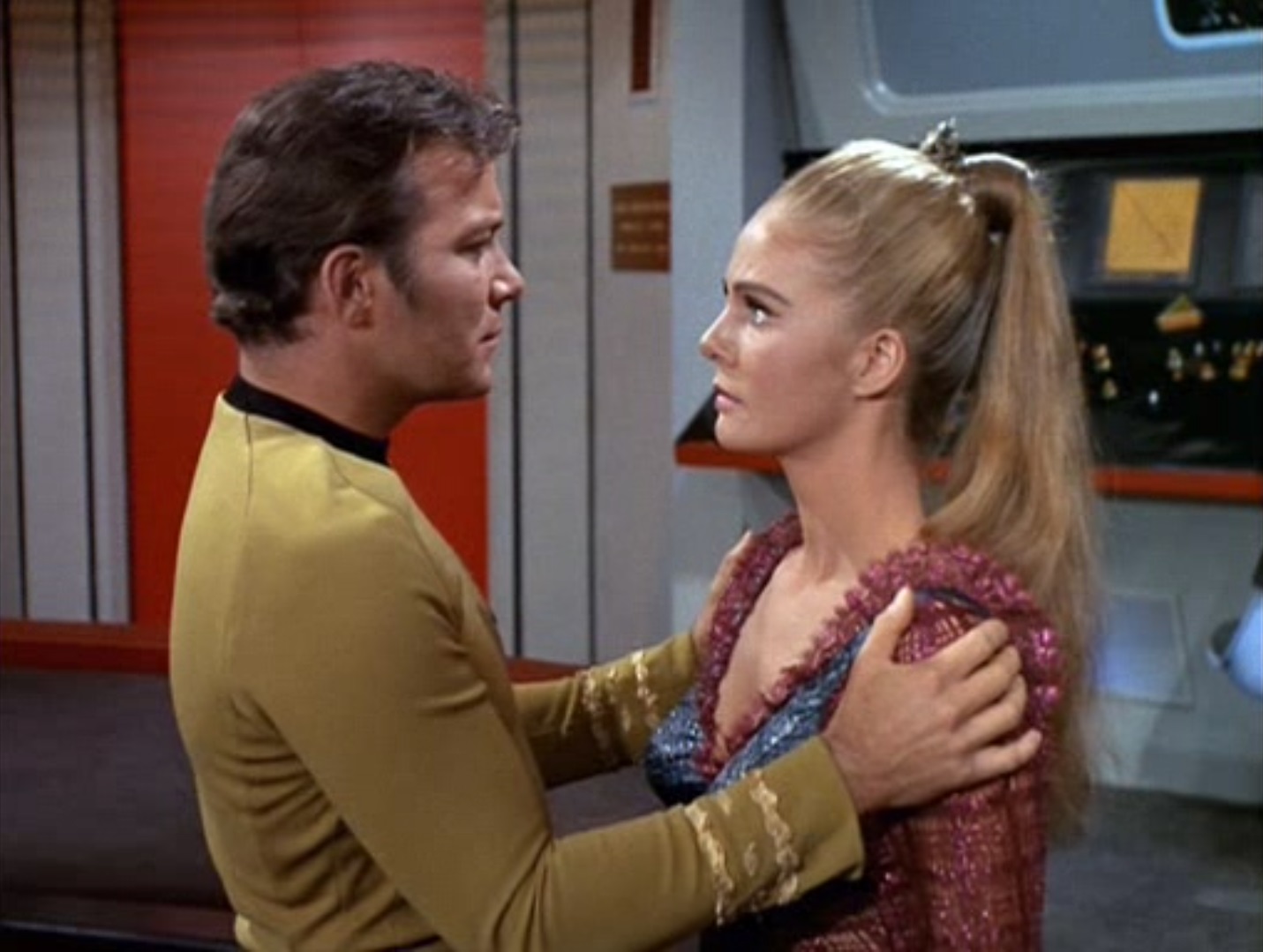
"I have. to. kiss you. Odona. It's in…the script."
I really want this episode to work. Not just because it bears an absolutely terrific name, but because it is genuinely entertaining to watch from beginning to end. Our crowd advanced a few hypotheses that I like. The best was that the ship was Odona's idea, and like the Dolman from "Elaan of Troyius", she could be refused nothing. Moreover, there was an intense voyeuristic desire on the part of the Gideonites to see beings in a truly open space, so this plan killed two birds with one stone. Another is simply that Kirk was drugged when he woke up, and the mock-up didn't need to be perfect (a la last year's Assignment: Moon Girl).
As for the idea that it is hypocrisy for the Gideonites to value life yet hatch a scheme to indirectly kill billions (trillions?), I am reminded of the orthodox Jew who could not turn on a light switch himself on the Sabbath, so he cannily lifted his infant son (too young to be bound by mitzvot) to within flicking range of the switch. And religion is, indeed, in the crosshairs of this episode, for did not Pope Paul VI this summer enjoin Catholics from using The Pill, humanity's main hope of stopping the population boom?
I'm writing this piece in the cold light of day, when I should be more inclined to savage the episode in light of its inconsistencies and absurdities. But I find myself feeling charitable—perhaps it's because director Jud Taylor finally seems to be finding his sea legs (even if Shatner. did. employ many. unnecessary pauses. last week).
Three stars.
Deeply Creepy

by Jessica Dickinson Goodman
Maybe it was the feral cats yowling over my fence in the middle of the episode, but this is for my money the creepiest episode we've seen yet. Something about those yearning, horrifying disembodied faces just got me right in the shivvers.
It also had me thinking about ferality, about what happens when something once tamed becomes unruly. Consider pigeons. Tamed and bred by humans for 10,000 years as messenger birds, companions, and beauties, only to themselves over the course of a bare century transition back to a wild world that they had never been prepared for.
The people of Gideon likewise seem to be at the devastating mercy of a too-too civilized society whose very progress towards perfection endangers their lives. Yes, I felt the storytelling placed too heavy a burden on just telling us that they love sex too much to prevent vicious overcrowding — a cultural quirk that felt too big to swallow. But the feeling of confinement, of encroachment and enclosure came through loud and clear.
In a way, their whole society had become feral: bred and evolved for specific purposes and suddenly set adrift with all of that breeding and evolution still in place, but none of the supports and expectations which allowed it to happen in the first place. The individuals seemed civilized enough, grading on a curve of aliens we've seen thus far, but the entire concept of a society so desperately, brutally crowded seemed fundamentally wild to me.
Let's get to the criticism. As beautifully creepy as the premise was, the synthetic bodysuits and wobbling crowded walks outside the windows were closer to funny than horrifying. The question of where they got space to build a 1:1 model of the Enterprise also beggared belief. Some science fiction and fantasy writers believe you get one big lie, a total of one shocking premise that the audience will just go with you on because, hey, it's a genre story, them's table stakes. But you only get one.
For me, the Big Lie of this episode was that Kirk was lost and wandering around a completely empty Enterprise. That was disturbing enough. But then it turns out many of the assumptions we'd taken on faith as an audience were false and that just felt like being crudely manipulated. I watch shows to be manipulated, but I like it to feel earned, not like I'm being rushed from plot point to plot point, each more giddily hideous than the next. She's not just a fake damsel in distress, she's the weirdo ruler's daughter! And a national hero! And dying of some exotic disease! That she wanted! So they could cull their society like a dairyman shrinks his herd when the price of milk is down!
That's just too many additional premises in one story for me.
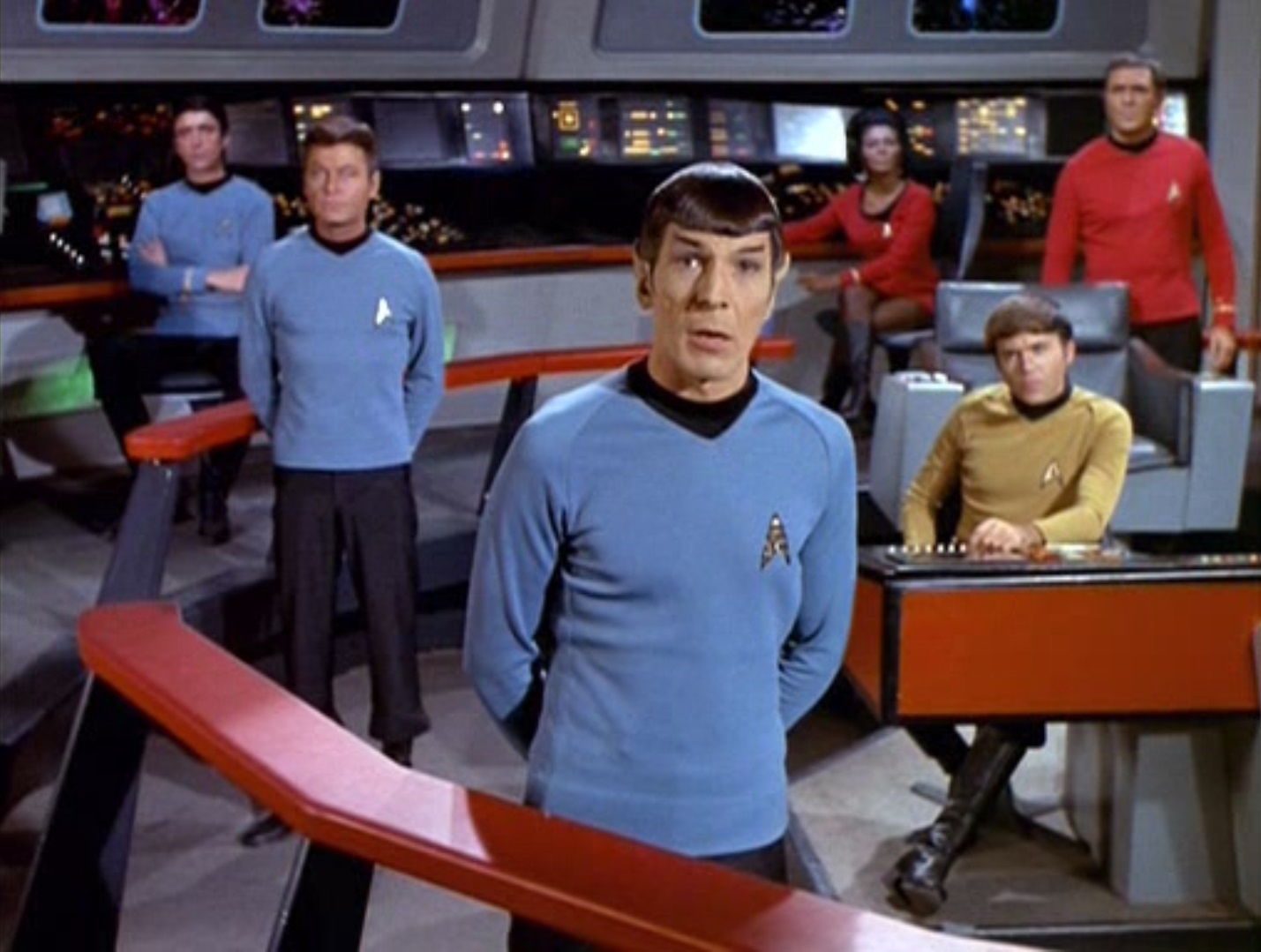
Even Spock is incredulous of this episode
I wish we'd kept the lens tightly on Kirk and the crew and the mysterious woman. I wish the weirdo ruler's throne room had given us a hint that claustrophobia was going to be the enemy of the day. And I wish we'd gotten more of the woman actress, she was doing so much with so little. I hope we see more of her.
Overall, this piece will be memorable for its premise and a few fine lines, but the execution was lacking.
2 stars.

by Erica Frank
Odona says, "There is no place, no street, no house, no garden, no beach, no mountain that is not filled with people." This sounds like the Earth of Harrison's Make Room! Make Room!: an overcrowded world, very little privacy, and extreme government measures to cope with the seemingly infinite population. (Can you imagine living on a planet with seven billion people, as we're expected to have on this planet by the year 2000?)
However, we get glimpses that imply it's worse than that. We are led to infer, from the masses of people in plain bodysuits visible behind the High Council room, that the planet is literally so crowded that they don't have space for a few rooms for office work. That aside from their fake Enterprise, there is no empty 20'-by-20' room on the planet.
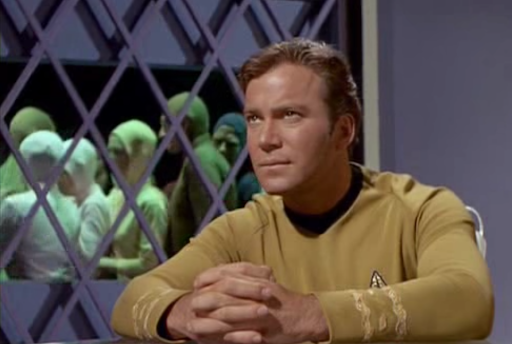
The real question isn't "are there really that many people" but "why do they have a viewing window into the High Council room?"
I reject this notion. I believe Gideon is crowded, yes, but not that it's so packed that most adults spend their waking hours packed like sardines, slowly bumbling around in huge crowds.
If that were so, how would they even find space to make the fake Enterprise? What happened to the people displaced by it? No, while I can accept that Gideon is "full of people," I cannot believe they are literally shoulder-to-shoulder across the planet, nor even "…except for special cases" like childbirth and whatever space is needed to design and sew the High Council's uniforms.
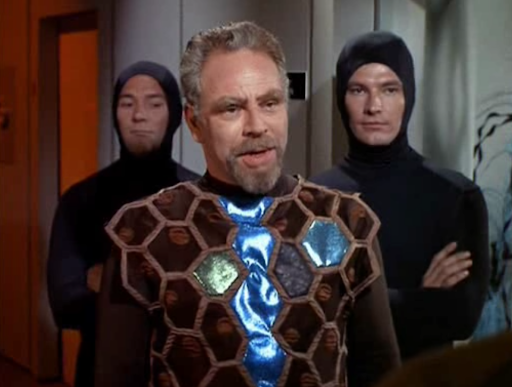
Perhaps they're made of hexagons because they can be assembled by hand — no space for a sewing machine necessary.
Do the people have jobs? Families? How are children raised? How do they maintain a culture focused on the "love of life" if they are just walking around staring at nothing all day?
My answer: The people we see are probably tourists — visitors to the Capitol, hoping for a rare view of the Council chambers, which is separated by one-way glass. They may be required to keep moving; that gives everyone a chance to see the Council when the glass is raised, perhaps a few times a day.
This is a ridiculous conclusion, but the whole episode is ridiculous. A culture that refuses birth control on ethical grounds will use a fatal disease to cull their populace? How will they decide who to infect — will they be selected by computer and told to line up for it, as in A Taste of Armageddon? Or will they volunteer to die, these miserable people who reject diaphragms, IUDs, and condoms because life is too sacred to prevent?
The individual scenes of this episode were fascinating but the underlying story just doesn't add up. Two stars.
Old Fools

by Joe Reid
The story this week was about a people claiming to love life so much that they couldn't harm one another, and so long-lived that they developed an overpopulation problem. Overpopulation so severe as to cause them to lure a Starfleet captain who survived a deadly space disease to their planet to infect them with the pox. Why? Perhaps this seemed like the most interesting way to die? For people who love life their treatment of every life seemed to be just the opposite.
Let’s start off on the grand scale. Unlike most of the technically advanced races in the galaxy, the Gideonites lacked the most basic imagination when it came to needing more space. If there isn’t enough space where you are, go somewhere else and find some. Am I to believe that a people who could perfectly reproduce a spaceship as a ruse weren’t able to produce their own ships to take them to other planets to spread out? What weak imaginations these advanced humanoids must have had to not consider that most basic of solutions. During his career Kirk had been to dozens if not hundreds of worlds where a hardy race like the Gideonites could expand.
The next charge affirming the utter hypocrisy of the Gideonites had to do with how freely they lied. Although it might not be fair to lay this charge at the feet of all the people, their leaders certainly were not honest Abes. They lied about transport coordinates. The location of the captain. The girl lied about her origins, claiming to know nothing about Gideon. The entire fake ship was a lie. They only ever resorted to the truth after each specific lie was uncovered, and not a minute sooner. It might explain how these leaders came to power. Even in our world, you don’t come to power by telling the truth. It makes me wonder if the planet was even named Gideon, although saying, “welcome to the planet Marcus”, doesn’t quite roll off the tongue.
[Au contraire, mon ami. We've already had a planet Marcus 12 in "And the Children Shall Lead". If Odona emigrated from planet Gideon to planet Marcus 12, she'd be "Odona Gideon Marcus 12" (ed.)]
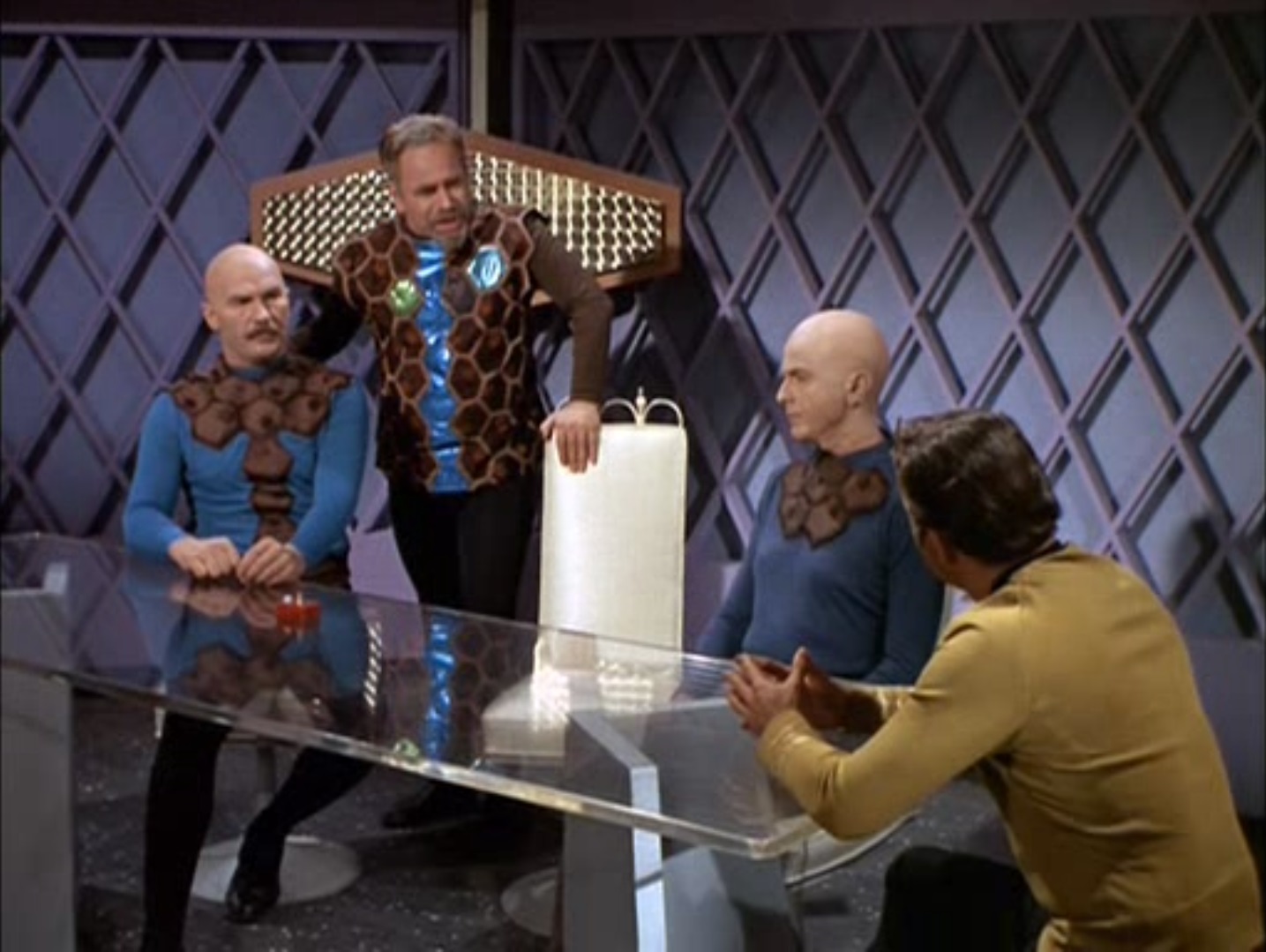
"Not only have we no space, but I am using the planet's only hairpiece!"
If they really did love life, it must only have been the lives of their own people. These Gideonites showed a complete lack of basic empathy for anyone who wasn’t them, for example, concocting a plan that lured an alien captain to their world to kidnap, imprison him, and bleed him dry. These actions sure sound out of character for the "lovers of life" they purport to be. In truth, the Gideonites were unimaginative in every sense of the word. Trapping their own people on a planet that can’t support them is evil for an advanced technical society. Using misdirection and bad faith negotiation tactics to carry out their shortsighted plan was contemptible. Making the incarceration and blood letting of an unsuspecting victim their plan to save a planet was morally bankrupt. Attempts by the leader's daughter to redeem their reputation by choosing to sacrifice herself in the end fell flat for me. There wasn’t enough good in the episode to salvage it from the bottom.
One star
[Come join us tonight (January 31st) for the next thrilling episode of Star Trek! KGJ is broadcasting the show live with commercials and accompanied by trekzine readings at 8pm Eastern and Pacific. You won't want to miss it…]




I could like this episode despite its faults, if it weren't for the fact that a new fault springs to mind every time I think about it even a little.
My biggest problem is probably this: How did the Gideons (Gideonites?) find out about Kirk's brush with Vegan choriomeningitis? Did the ambassador just ask, "Sooo, any of your starship captains ever recover from a particularly deadly disease," and get an answer? I certainly hope not.
I also ask myself why they couldn't just order a few different strains of various diseases from some Federation scientific supply company. I mean, you or I aren't going to find something like that in the Fisher Scientific catalogue, but governments have access to more interesting resources.
It also took Kirk far too long to realize he was aboard a fake. Gideon might have been able to create a reasonably facsimile from engineering schematics, but what about the little nicks and scratches from everyday use that Kirk should be familiar with. What about his personal effects? He should have spotted something wrong the first time he entered his quarters–and then Spock's and McCoy's quarters, too.
There's just too much I can't buy here.
Wig Trek: yes
Cave Trek: no
Fog Trek: no
Doinnggg Trek: no
Love Trek: yes
Relevance Trek: yes
“Relevance Trek” teleplays are meant to interest audiences who like stories that are really about current events, preferably with takes on them that will have broad appeal. Tonight’s topic: “overpopulation”!*
The teleplay strains even TV credibility with at least three elements.
First, the Enterprise mockup thing is unbelievable. The Gideonites would have had to examine the Enterprise at leisure for a long time in order to rig up their fake, or at least would have had to have extremely detailed plans to work with. Why the bogus Enterprise? Well, thematically it sets up a contrast of extreme loneliness with crowding – which perhaps doesn’t make a lot of sense. Too obviously, it manipulates the audience with a Twilight Zone-type “Where Is Everybody?” eeriness.
Of course, it was cheap – the principal “new” set for the teleplay is the set that’s been used every week for three years.
Second, we are to infer that Kirk and Odonna proceeded rapidly to sexual relations. (This is underscored by her remark, after she becomes ill, that their relationship “began here” – i.e. on a bed, perhaps this very bed, on the Enterprise.) That’s how she contracts his meningitis. So on this planet with too many people, the solution involves sexual relations (Odonna’s and Kirk’s) without birth control! Considering the pro-contraception message the teleplay implies, that’s pretty weird.
Third, McCoy saves Odonna’s life. Her role now will be, to be the Typhoid Mary of an entire planet. She is to watch with great serenity of mind as a global pandemic culls the planetary population. However, assuming that not everyone the planet (except Odonna) dies, presumably lots of survivors will be resistant to the virus, and their genetic resistance will be passed on to their children, and so Gideon will find itself eventually in the same place as before. By the way where are they going to bury/cremate all those corpses?
The scenes early on with Spock sparring with the diplomate are amusing.
*”Overpopulation” is in quotation marks because it is a newly popular concept that confers a “scientific” patina on real-world facts that might be much more complex than it suggests. The reality seems to be more nuanced: overpopulation must refer to a region’s capacity to provide water, food, shelter, security, etc. to a regional population. Thus in our world “overpopulation” may be an issue in certain places, while other places are capable of being food exporters, have plenty of open space, are secure from criminal violence almost all the time, etc. The scenes we are seeing from Biafra may be contrasted with enormous stretches of the American Midwest. The Star Trek teleplay postulates a planet-wide state of crowding that is not exactly the same as the “overpopulation” we read about now, which has to do with scarcity of resources more than crowding even though some urban areas are lacking in water, sanitation, etc. for the people living there.
For me, the Gideonites seem far, far too comfortable with planning a genocidal global pandemic.
Early Star Trek was concerned with the horrible unforgivable crimes of Kodos the Executioner who saved his planet from famine by killing… I think it was 4000 colonists…? This was an obvious reference at the time to the search for escaped Nazi war criminals.
Now, the writers of Star Trek are defending killing… Billions? Multiple Billions? (If they're not defending it, they're certainly trying to make it appear palatable.)
Good Grief! If the Gideonites really want to go that way, and they've already built a duplicate Enterprise, they could just General-Order-24 their own planet and have done with it.
Even the Murderous Klingons with their Nerve Gas seem more morally acceptable than these Genocidal Maniacs.